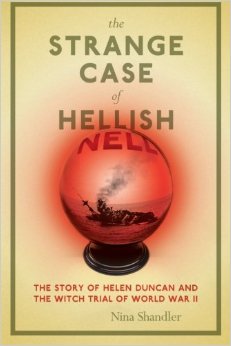 Liz Milner wrote this review.
Liz Milner wrote this review.
The Strange Case of Hellish Nell is a fascinating true-life tale of the supernatural. Even Nina Shandler’s hackneyed prose cannot diminish my enthusiasm for this story.
In 1944, when the Blitz was at its height, a Scottish psychic named Helen (“Nell”) Duncan revealed an uncanny familiarity with British classified intelligence information during séances. Her spirit guides communicated top-secret information on British casualties that the War Office deemed harmful to public morale. This, and her frequent travels between the two strategic locations of Edinburgh and Portsmouth, caused military authorities to fear she was a using her role as a medium to spy for the Nazis. A way had to be found to keep Mrs. Duncan quiet and an enterprising War Office bureaucrat found it in a long-ignored statute, The 1735 Witchcraft Act, under which Duncan was arrested, convicted of “conjuration” and held at Holloway Prison for the rest of the war. Duncan was the last person in Britain to be convicted of witchcraft.
This month, (January 2007), a new campaign to clear Duncan’s name was launched by her grandchildren. They are circulating a petition calling on the British Home Secretary to grant a posthumous pardon to Helen Duncan. Their campaign has garnered support from all over the world, including experts from the Salem Witch Museum in Salem, MA.
Several books have already been written on Helen Duncan, [most recently Hellish Nell: the Last of Britain’s Witches by Malcolm Gaskill (2001)], and Nina Shandler makes no attempt to explain what, if anything, her book adds to our knowledge of the case. In her retelling of Helen Duncan’s story, Shandler demonstrates how the tools of creative non-fiction in the hands of a hack writer can create some bizarre and embarrassing writing.
Chapter 2, for example, opens on Mrs. Duncan “in another woman’s bedroom” naked and musing on her husband’s betrayal. I assumed that the stage was being set for a psychic threesome and the revelation of the more kinky properties of ectoplasm. Instead this pandering paragraph led to the information that Mrs. Duncan was being strip-searched by female nurses in a private house before a séance so that researchers could be sure she wasn’t hiding anything in her clothing or body cavities. The “betrayal” Duncan is musing on happened years before when her husband permitted doctors to do a gynecological examination on her without her consent.
Throughout the book, we have too much access to the characters’ most banal thoughts. This is especially true during Shandler’s flashbacks to Duncan’s childhood where we learn how Helen Duncan gained the nickname “Hellish Nell” through her tomboy larking about in the twee Scottish village of Callander. At one point, Nell has a chin wag with God:
Then, wee Nellie MacFarlane heard a voice whispering in the gentle wind, blowing down from Ben Ledi, from the Hill of God itself, and across the River Teith, come to comfort her. “Nell. You did see him. In time, many will believe you.” Nell felt calm descend over her. Mummy didn’t believe her but God knew better. . . .
Shandler also reports some very far-fetched stories as factual. For example, she says that Duncan and her husband met “in a dream.” Later, when Duncan needed someone to look after her oldest child, an obliging caravan of gypsy strangers took the child holidaying in the country and brought the little girl back a couple weeks later. The child came back minus one eye due to an attack by an enraged ferret.
Shandler’s writing illustrates Mark Twain’s dictum that “The difference between the right word and almost the right word is the difference between the lightning and the lightning bug.” Describing chunks of coal falling out of the back of a train, Shandler writes, “the coal poured out like lava.” Earlier on, she pens such cringe-worthy lines as, “the red ink dripped with disdain,” and “His Majesty’s Mediterranean Fleet had secreted its way back to home port.” Nell is not the only one whose behavior defies the laws of nature. Shandler writes that under cross-examination, “Detective Ford’s kinky hair curled tighter, and his burro-like eyes popped wider.”
Footnotes are used in a weird and excessive manner. The fact that Helen Duncan made good mealy pudding gets two footnotes. My favorite footnote is, “The cab drove off.”14
Shandler seems to have it in for Mrs. Duncan. Every time Duncan is mentioned, Shandler expresses her revulsion with Duncan’s girth. Nell never walks anywhere. She “lumbers,” “shuffles,” “tromps,” and “plods.” She never cries, she only “snivels.” Shandler describes her as “a disgraced bear,” “a cow.” Her breasts are likened to udders. Shandler does this to such an extent that I began to feel very uncomfortable with Shandler’s “lookest” attitude.
Shandler may have picked some of this loathing for Duncan up from Harry Price, “the psychic detective,” who made it his special mission to harass Helen Duncan. Price had an unholy obsession with Mrs. Duncan’s orifices, believing that because she was fat, her body cavities were able to house a veritable prop room of séance paraphernalia. He also believed that, like a cow, she had two stomachs and could regurgitate muslin “ectoplasm” silently and at will.
Though Shandler’s prose is inept, her pacing kept me turning pages. She cuts right to the chase and the book never bogs down in explanations of psychic phenomenon or British legal practice. The Strange Case of Hellish Nell moves at a thrilling clip and the tale is perfect tabloid fodder in that it is both grotesque and engrossing.
(Harper, 2006)
